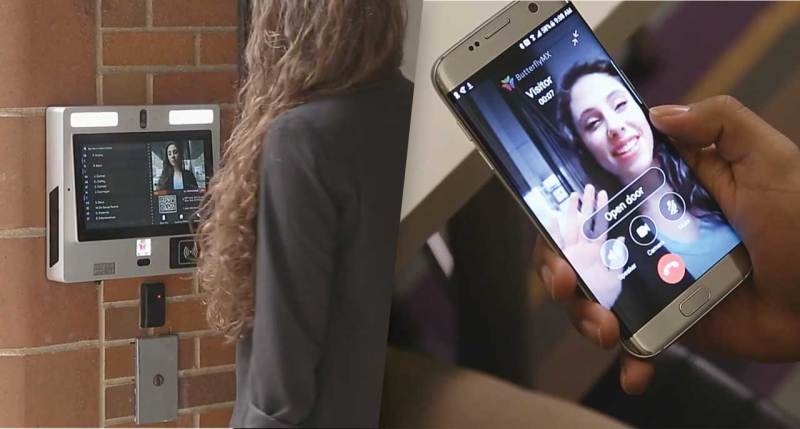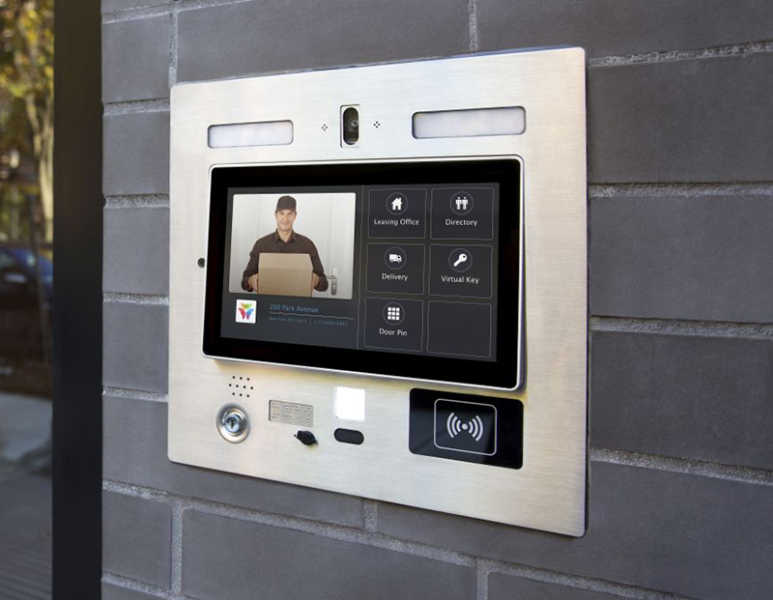Smart intercom maker ButterflyMX today raised $35 million in a growth equity round led by Volition Capital that brings its total raised to date to over $58 million. (Egis Capital, RiverPark Ventures, and Stifel Financial participated.) A company spokesperson said that the fresh capital will be used to expand into new markets, hire on 80 new employees by 2021, and introduce products that extend ButterflyMX’s intercom experience from the front door to the rest of the building.
Contactless entry technology, which is anticipated to be an over $22 billion market by 2027, is experiencing growth during the pandemic despite evidence that infection by touch is rare. A recent CBRE survey of 203 companies found that roughly half are considering installing touchless technology as part of their plans to return to the office.
ButterflyMX’s weatherized intercom, which comes in 7- and 11.6-inch surface or recessed flavors, offers video calling so that residents can get a preview on their smartphones. It only requires internet, power, and door strike — as opposed to wiring or in-unit hardware — and it plays nicely with existing systems. Using ButterflyMX’s visitor access feature, managers and apartment owners can create QR codes and 6-digit PINs to let in friends, family, house cleaners, dog walkers, and other service providers. A resident directory searchable by name and unit number supports the addition and removal of residents with a click and integrates with existing management systems, as well as with access control systems and keyless locks.

In buildings that support it, ButterflyMX users can unlock key-fobbed elevators for a brief period of time from either intercoms or the ButterflyMX mobile app. ButterflyMX supports voice assistants like Siri and Alexa, enabling tenants to unlock doors with a voice command. Visitors can leave a voice message if tenants aren’t around to answer. And couriers en route to package rooms get a PIN; recipients receive a notification, text, or call when their package has been delivered.
ButterflyMX claims its intercoms are already installed in over 4,500 multifamily, commercial, and student housing properties around the world, covering more than 465,000 apartments. But questions abound about the privacy of its systems.
ButterflyMX says it collects audit trails showing door entries logged with a time, date, and photo, which the company stores for an entire year (365 days) in an encrypted AWS instance. Pictures of couriers and residents are snapped and time-stamped at package delivery and pickup time, and ButterflyMX says property managers can see usage and feature adoption stats on-demand.
Moreover, ButterflyMX’s privacy policy states that it might receive location information from users of its mobile apps. It also implies that information associated with text messages sent or received via ButterflyMX’s services may be collected and maintained for an indeterminate amount of time, including phone numbers, wireless carrier names, the content of the messages, and the date and time of the transaction.

A spokesperson told VentureBeat via email that when one of ButterflyMX’s intercom systems is installed, the property owner or manager provides the company with a list of all the tenants who live in the building. This list includes the tenants’ names, email addresses, and phone numbers. As part of the onboarding process, ButterflyMX sends tenants an email explaining the system has been installed in their building, how it works, and a link to register for an account.
ButterflyMX says that it doesn’t currently offer facial recognition because it “believe[s] smartphone-based access is more secure and convenient.” However, it says that it “may adjust [its] product offerings” if technology and consumer preferences change.
In August, in an effort to bring awareness to systems like ButterflyMX, the AI Now Institute, People Power Media, and the Anti-Eviction Mapping Project launched a crowdsourced map examining where landlords have installed surveillance and AI technologies that may disempower tenants and community members. The site invites tenants to self-report the types of tech being installed in their residences and neighborhoods and aims to help educate people about the widespread use and potential harms of these technologies.
There’s currently scant legislation governing the collection and use of data in the context of real estate. Owners and landlords typically purchase and install tech products and platforms without notifying tenants in advance or discussing potential harms with them — and sometimes without even letting them know.
Residents and local elected officials have been quick to rail against these types of systems. Last October, the New York City Council proposed regulation that would force landlords to provide tenants with traditional metal keys for entering their buildings and apartments. A tenant in Hell’s Kitchen secured the right to physical keys for himself and his neighbors in May, after suing his landlord.